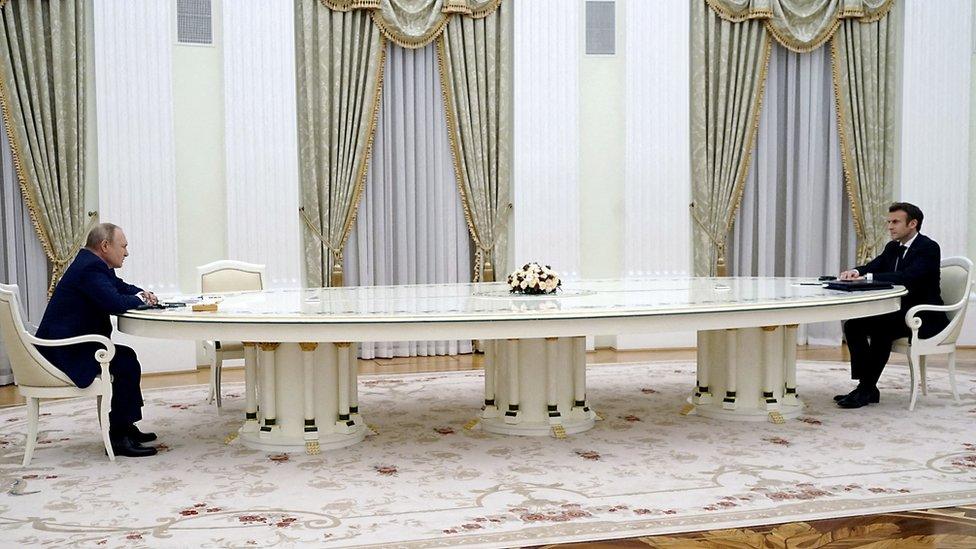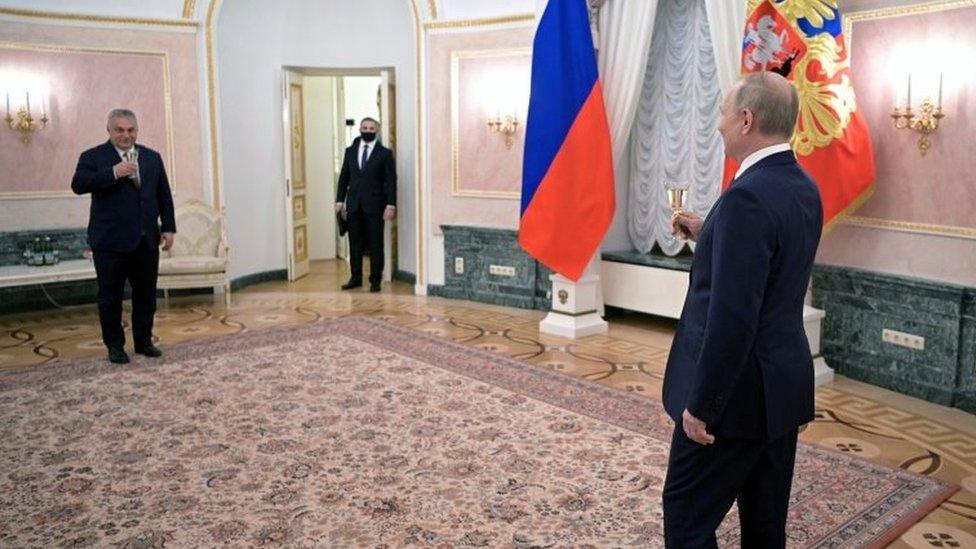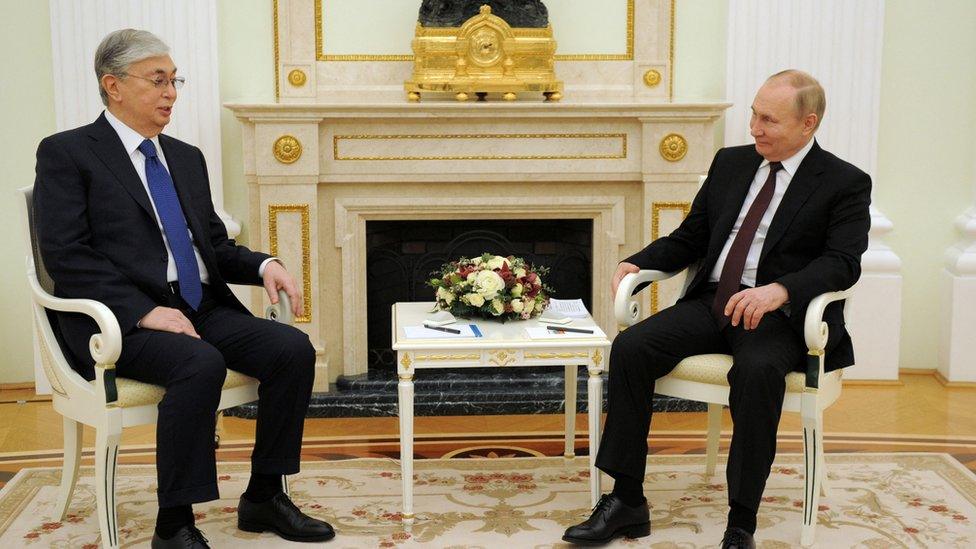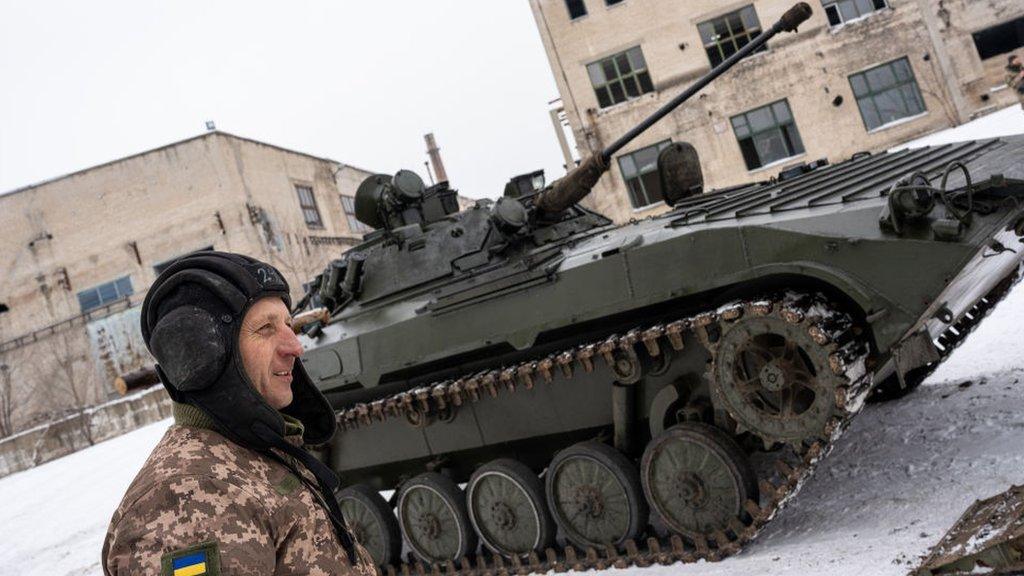Macron refused to take Russian Covid test
- Published

The four-metre table between Mr Putin and Mr Macron was widely commented upon
French President Emmanuel Macron refused a Russian Covid test ahead of his meeting with Russia's Vladimir Putin, the Kremlin has confirmed.
The test required a health protocol that was unacceptable and did not fit with the French leader's schedule, a French source told the BBC.
It follows reports that Mr Macron refused the PCR test over fears the Russians would get hold of his DNA.
The leaders subsequently held a socially-distanced meeting on Monday.
They did not shake hands and sat with a four-metre-long table between them, with observers wondering whether Mr Putin was using it to send a diplomatic message.
But French diplomatic sources told Reuters that Mr Macron had been told to choose between accepting a Russian PCR test to get closer to Putin or abide by strict social distancing rules.
"We knew very well that meant no handshake and that long table. But we could not accept that they get their hands on the president's DNA," one of the sources told Reuters.
The source did not elaborate on how the Russian intelligence services could exploit Mr Macron's DNA.
A source at the Elysée Palace told the BBC: "The conditions imposed for the meeting to take place with no social distancing required a health protocol which were according to us unacceptable and incompatible with the president's schedule."
The Kremlin confirmed that Mr Macron had been kept at a distance from the Russian leader because he had declined to take a Russian test.
Kremlin spokesman Dmitry Peskov said Russia understood the French position and it had not affected the talks.
Mr Macron had carried out a PCR test before leaving France and his doctor carried out an antigen test once they were in Moscow, another French diplomatic source told Reuters.
"The Russians told us Putin needed to be kept in a strict health bubble," the second source told Reuters.

DNA - 'the most valuable thing you own'

For decades, spies have profiled foreign leaders - trying to understand their personality, how they might react to situations and how long they might last in office. Part of that is understanding their health. That used to be hard.
But advances in science mean that one sample of DNA can now unlock powerful insights into someone's past, present and even future - is a foreign leader hiding an illness or particular condition or are they susceptible to one in the future?
The US security community has recently claimed that China has been gathering large amounts of health data about a wide range of people.
It has issued warnings for people to be careful what they share, arguing DNA is "the most valuable thing you own" and saying that unlike losing a credit card, you cannot replace your DNA once someone else has the details.
More than a decade ago, the US itself was accused of trying to get hold of biometric data, including DNA, belonging to foreign diplomats.
All of this is a sign that biometric intelligence is now a key part of security.


Cheers from a distance! President Putin (right) and Hungarian PM Orban (left) drink champagne at a Kremlin reception
Mr Macron is not the only leader to have been subjected to the Kremlin's "long-table" diplomacy - earlier this year, Hungarian Prime Minister Viktor Orban and Iranian President Ebrahim Raisi were also seen sitting at a distance from Mr Putin during their visits to Moscow.
The Kremlin has taken extra precautionary measures to protect Mr Putin, who later this year turns 70 and who has been given Russia's Sputnik V vaccine, from getting infected.
However, only three days after meeting Mr Macron, Mr Putin hosted Kazakhstan's President Kassym-Jomart Tokayev. The pair shook hands and sat with a small coffee table between them.

The table between Mr Putin and Mr Tokayev was much smaller
During their meeting Mr Macron and Mr Putin spoke for five hours about the tensions over Ukraine.
Western countries say Russia could invade Ukraine but Russia denies planning to do so despite having massed more than 100,000 troops on Ukraine's border.
The US State Department has urged Americans in Ukraine to leave immediately.
- Published9 February 2022
